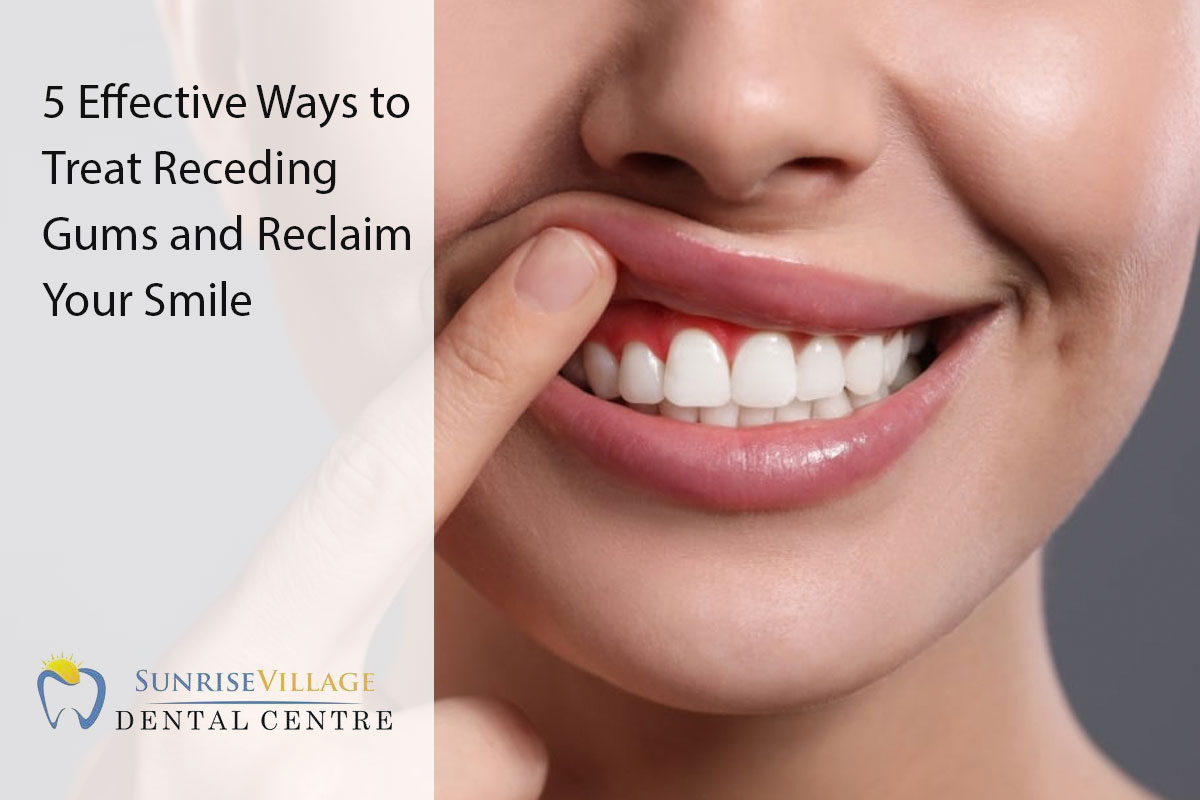
Are receding gums affecting your smile? You’re not alone—this common dental issue can cause sensitivity, tooth loss, and lower self-esteem. Fortunately, effective treatments and preventive measures can help restore your smile and keep your oral health in check.
What are receding gums?
Receding gums, or gingival recession, happen when gum tissue around the teeth pulls away, exposing more of the tooth’s surface or root. This can cause increased sensitivity, an unattractive appearance, and a higher risk of tooth decay and other oral health issues. Gums protect the sensitive tooth roots, which are more vulnerable than the enamel-covered crowns. When gums recede, the exposed roots become susceptible to damage and decay. Receding gums can develop gradually or quickly for various reasons and affect people of all ages. Understanding the causes and signs is crucial for preventing and treating gum recession, helping you maintain a healthy smile and reduce further dental problems.
Common causes of receding gums
- Aggressive Brushing: Using a hard-bristled toothbrush or brushing too vigorously can wear away gum tissue. Use a soft-bristled toothbrush and brush gently.
- Poor Oral Hygiene: Plaque and tartar buildup from inadequate cleaning can irritate and inflame gums, causing them to recede. Regular brushing, flossing, and professional cleanings are essential.
- Gum Disease: Conditions like gingivitis and periodontitis, caused by bacterial infections, can lead to gum recession and potential tooth loss if untreated.
- Genetics: Some people have genetically thinner, more fragile gum tissue, making them more prone to recession, especially if combined with other factors like poor oral hygiene or teeth grinding.
- Teeth Grinding (Bruxism): Grinding or clenching teeth, often during sleep, puts pressure on gums, leading to recession, particularly in those with a misaligned bite or TMJ issues.
- Tobacco Use: Smoking and other tobacco products increase the risk of gum recession, gum disease, and tooth loss. Quitting tobacco is crucial for healthy gums.
Signs and symptoms of receding gums
- Increased Tooth Sensitivity: Exposed roots become sensitive to hot, cold, and acidic foods and drinks, noticeable during eating or brushing.
- Visible Tooth Roots: Exposed roots appear as yellow or darker discoloration at the gum line, causing an uneven, unsightly look.
- Localized Gum Recession: Recession may affect only one or a few teeth, indicating localized issues like improper brushing or a misaligned bite.
- Notched or “Long” Teeth: Receding gums make teeth appear longer or more prominent, leading to an uneven gumline.
- Higher Risk of Tooth Decay and Gum Disease: Exposed roots and receded areas are more vulnerable to cavities and gum disease.
Treating receding gums
- Improve Oral Hygiene Practices
- Brush gently with a soft-bristled toothbrush: Use gentle, circular motions to clean your teeth and gums, avoiding vigorous scrubbing.
- Floss daily: Remove plaque and food debris from between teeth to reduce the risk of gum inflammation and recession.
- Use a fluoride-containing toothpaste: Strengthen tooth enamel and reduce sensitivity in exposed root surfaces.
- Rinse with an antiseptic mouthwash: Control bacterial growth and prevent gum disease with mouthwashes containing ingredients like chlorhexidine.
- Try Natural Remedies
- Oil pulling: Swish oil (coconut or sesame) in your mouth for 15-20 minutes to reduce plaque buildup.
- Aloe vera: Apply aloe vera gel directly to the gums for its soothing and anti-inflammatory effects.
- Green tea: Drink green tea for its antioxidants and anti-inflammatory properties.
- Turmeric: Use turmeric, which contains curcumin, for its antimicrobial and anti-inflammatory benefits.
- Use Dental Procedures to Restore Gum Tissue
- Gum grafting: Surgical procedure to graft tissue onto receded gum areas.
- Pinhole surgical technique: Minimally invasive procedure to shift gum tissue to cover exposed roots.
- Guided tissue regeneration: Encourages regrowth of lost gum and bone tissue.
- Address Underlying Causes
- Treating gum disease: Deep cleaning (scaling and root planing) to remove plaque and tartar.
- Correcting misaligned bites: Orthodontic treatment or other measures to fix improper bites.
- Quitting tobacco use: Essential for reducing the risk of gum recession and other oral health problems.
- Managing teeth grinding or clenching: Use a custom nightguard to protect teeth and gums.
- Consider Gum Recession Prevention Strategies
- Practice gentle, thorough oral hygiene: Brush and floss regularly with a soft-bristled toothbrush.
- Schedule regular dental cleanings and checkups: Early detection and treatment of gum recession.
- Wear a nightguard if you grind or clench your teeth: Prevent damage from bruxism.
- Quit or avoid tobacco use: Reduce the risk of gum disease and recession.
- Maintain a balanced, nutrient-rich diet: Support healthy gum tissue and overall oral health.
When to see a dentist for receding gums
If you’re experiencing signs of gum recession, it’s important to seek professional dental care promptly. Delaying treatment can lead to more damage and costly procedures. Here are key signs that it’s time to see a dentist:
- Increased tooth sensitivity: Sudden or gradual sensitivity to hot, cold, or acidic foods and drinks.
- Visible tooth roots: Yellowish or darker root surfaces indicate receding gums.
- Changes in gum line: Uneven or “notched” appearance of the gumline.
- Persistent gum inflammation or bleeding: Red, swollen, or easily bleeding gums when brushing or flossing.
- Family history of gum disease: Regular check-ups are important if you have a genetic predisposition to gum problems.
Your dentist will examine your gums to assess the extent of recession and identify the cause. They will recommend treatments like improved oral hygiene, professional cleanings, or advanced procedures like gum grafting or the pinhole surgical technique.
Conclusion
Receding gums can be a concerning dental issue, but effective treatments and preventive measures are available. Understanding the causes, recognizing the signs, and implementing a comprehensive approach can help you manage this problem and maintain a healthy smile. Early intervention is crucial, so seek care at the first signs of recession. Don’t let receding gums hold you back—start your journey to better oral health today. To schedule an appointment with Sunrise Village Dental, call (604) 253-2433 today.
